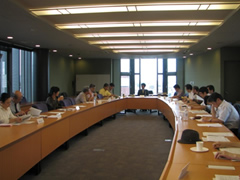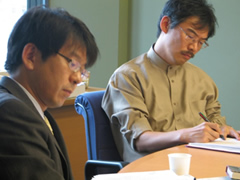Center for Interdisciplinary Study of Monotheistic Religions(CISMOR)Doshisha University
> Past Research Activities > I. Berlin and L. Strauss: Political Minority and Jewish SecularismPast Research Activities
Study Meeting #3, 2009
I. Berlin and L. Strauss: Political Minority and Jewish Secularism
| Date: |
2009/07/11 14:00 - 18:00 |
|---|---|
| Place: | Conference Room, Kambaikan 6F, Doshisha University |
| Speaker: |
|
| Commentator: |
|
| Summary: | |
|
“The Jewish Aspect of I. Berlin’s Liberalism” by Professor Shin’ichiro HAMA Isaiah Berlin was a Russian-born Jew, a historian of ideas and a political philosopher who later became an Oxford professor. The “Two Concepts of Liberty” he advanced in 1958, or his argument dividing political liberty into “positive liberty” and “negative liberty,” has become an essential premise when considering the topic of “liberty.” Prof. Hama first explained that “value pluralism” is at the center of Berlin’s argument on liberty. Value pluralism regards each value as incommensurable and incompatible, and therefore, conflict cannot be avoided. After explaining this, Prof. Hama, relying on the latest research about Berlin, made clear the “Jewish-ness” of Berlin’s brand of liberalism. What did Berlin think of a Jewish identity, and how did this relate to his support of Zionism? To understand this, we should focus on Berlin’s thinking on “nationalism.” Whether Marxist or liberalist, political theorists in the 19th and 20th centuries underestimated the “power of nationalist thought.” Berlin placed great emphasis on it. This power of nationalist thought, with pluralism at its foundation, is neither exclusive nor aggressive. Berlin distinguished between “political nationalists” and “cultural nationalists,” and advocated the type of “national consciousness” represented by the latter. The average liberalist overlooks the following fact. Today, as modernization engenders a state of isolation, it becomes necessary to seek a new identity. To seek a new identity, a community is required. The significance of a “national consciousness” can be understood on the basis of this need for belonging. In this way, a “Jewish identity” or “Zionism” is also related to this “need for identification.” Furthermore, Berlin’s support for Zionism can be attributed to his acknowledgment that the Jewish attempt to assimilate was a failure. Assimilation neither brought rise to a stable identity nor could it have any “authenticity” to begin with. Zionism was necessary for authenticity, self-determination, and self-sufficiency. Even then, Berlin rejected the intolerant choice that Jewish people had to either relocate to Israel or give up their uniqueness and identity as a Jew. Berlin believed that Zionism gave Jewish people the freedom to choose between living in a Jewish environment or a non-Jewish environment. This was how Berlin integrated liberalism and Zionism. Throughout his life, Berlin was an avid supporter of Israel, but in this work, he did not touch on Jewish thought, nor did he mention Israel’s acts of aggression. After presenting these issues and the criticism of them, Prof. Hama ended his talk by expressing the significance and possibilities of the thinking in which Berlin sought a “decent society,” or a society slightly better than one in a desperate situation. Summary by Ryuji FUJIMOTO CISMOR Fellow (PD) “The Double Minority: Contemporary Philosophical Criticism of the Jew Leo Strauss” by Prof. Hisao TAKAGI Leo Strauss was a German-born Jew who fled Nazi persecution and immigrated to the U.S. in 1938, where he later became a political professor at the University of Chicago. In recent years, Strauss has abruptly gained attention as the philosophical founder of neo-conservative (“neo-con”) thought, but, as research is beginning to make clear, this popular conception cannot possibly capture all of the multifaceted Strauss. According to Prof. Takagi, early on, Judaism was not seen as a significant element of Strauss’ philosophy. However, around 1990, there was a rediscovery of “Strauss, the Jewish philosopher.” An important basis for this reevaluation, which was repeatedly cited, was Strauss’ preface to Spinoza’s Critique of Religion (the English translation). In it we can see, via Spinoza, Strauss’ lifelong and significant interest in the great Jewish medieval philosopher Moses Maimonides. Though Strauss was involved with Zionism in his youth, rather than actual politics, he confronted face-on the theological-political problem as understood by modern Jewish thinkers, thereby grappling with the “Jewish issue.” In particular, Strauss questioned modern liberal democracy, which rests upon the principles of freedom of speech and relativism. Liberal democracy even permits “liberty with evil intent” and “aggressive speech,” and ultimately it sanctioned Nazism. Strauss’ undertaking was to critically scrutinize this brand of liberalism and rationalism and, furthermore, to reassess the “conflict between reason and revelation,” or the age-old belief–knowledge problem. Prof. Takagi illustrated this point through examples of Strauss’ criticism of Hermann Cohen and Franz Rosenzweig. What should we use to help reevaluate such questions? Strauss looked to the Middle Ages and the Ancients, particularly to the esoteric writer Maimonides. Maimonides’ concern was how to reconcile the medieval Jews’ pious faith with Aristotelian philosophy. According to Strauss, Maimonides used double meanings. On the surface, a phrase seemed to explain morality in a straightforward manner based on the authority of the Bible, but on another level, philosophical truths were hidden among the words. To critically evaluate contemporary liberalism, one must partake in a careful reading of secret writings that contain philosophical truths. Therefore, in his late years, Strauss focused on liberal education for young people to learn this technique of close reading. The sort of prescription offered here for contemporary secular liberalism can be difficult to accept. That is because, to an Orthodox Jew, Strauss seems to unfairly place Torah scholar Maimonides on the Athenian side; and, from the perspective of contemporary participatory liberalism, even if Strauss had expectations for philosophical tradition or liberal education, his ideas are elitist. Takagi painted a picture of Strauss as a double minority—being, as he was, both a Jew and a philosopher—who went against the basic understanding of the majority in each group. Summary by Ryuji FUJIMOTO CISMOR Fellow (PD) |
|

